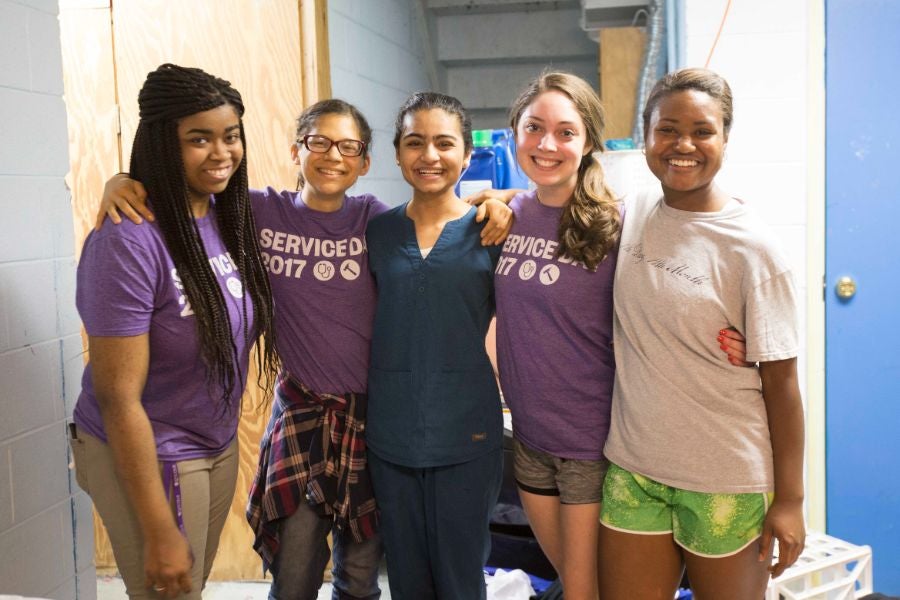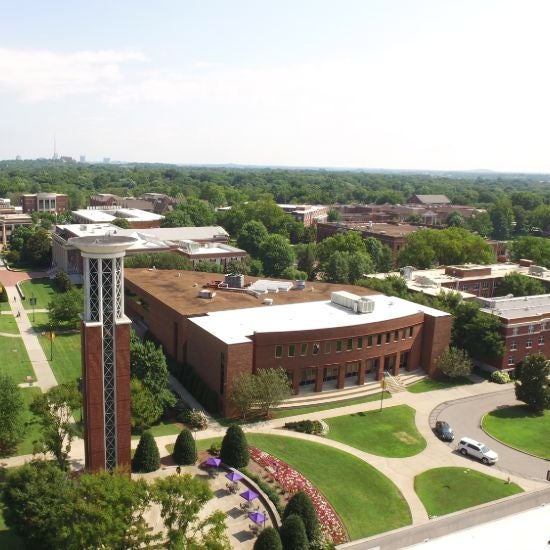College Search Guide: Find Your Place
Whatever stage of high school you're in, this guide is a valuable tool as you determine which school is right for you—from initial research to admissions tips.

“Where do you want to go to college?” How many times have you heard that question lately? You’re probably asking yourself the same thing. You have ideas of what the perfect school for you looks like. A place that will welcome all you bring, give purpose to your potential and send you into the real world ready to chase down your dreams.
But what should you be doing now to find the right school for you? Here are some questions and tips to guide you through the process.
What Our College Search Guide Covers
We suggest reviewing the guide in its entirety. All of these questions and tips build on each other to help simplify the process of choosing a college or university. Start by narrowing down your search and end with a checklist of necessary tasks to be done.

Narrowing Down Your College Search
All the college options can seem daunting. How do you figure out what schools you want to focus on and learn more about? Here are 10 questions to help you decide which schools might be right for you.
1. What size school am I looking for?
A large student population and sprawling campus offers a different experience from a small student body and a cozy campus. Which environment is better suited to you?
Don’t try to take college by yourself. The university is here for you. And that’s the good thing about a small university. They can really focus on you and really plug you in. — Julia Carvalho Correa ’23 | International Business | São José dos Campos, Brazil
2. Do I want to attend a public school or a private school?
An in-state public school might seem like a more affordable option based on sticker price, but a private school could offer more opportunities for connections and financial aid.
3. Is it important to me to attend a Christian school?
If you find yourself drawn to private colleges, you should consider whether you want to learn in a place that encourages your faith.
Pay attention to who you are when you are looking for colleges. At the end of the day, you’re going to get a degree, but whether or not you grow as a person and really enjoy your time has a lot to do with things outside of the academics that a college has to offer. — Alexis Cole (’22) | Bristol, Virginia | Theology and Ministry

4. Where is the school located?
It could be a big city (like Nashville), somewhere more secluded or a college town where the university is the focal point of the community. The kind of place where you want to live could play a big role in your college search.
5. How much does it cost?
You’ll pay tuition and fees anywhere, but the total cost can vary greatly from one school to the next. Factor in opportunities for scholarships and financial aid that could significantly decrease your cost of attendance.

6. Can I get in? What are the admissions requirements?
Colleges have certain standards students must meet to earn acceptance. Find out what it takes to get in and think about how your credentials stack up. Some schools only look at your grades and standardized test scores, while others consider the whole person, not just the numbers.
7. Does it have the major I want to study? If I change my mind, will I have options?
Choosing a major is a tough decision. Maybe you’ve always known what you want to do, maybe you have some ideas, or maybe you have no clue. See if a college offers a program that lets you pursue your interests. Remember that lots of options means you can figure it out as you go or have a backup plan if you realize your intended major isn’t what you expected.

8. What can I do on campus?
Look at the extracurricular activities like campus organizations and intramural sports. Is having a team to root for important to you? These opportunities will shape your college experience as much as your classes, so make sure a school offers something that appeals to you.
9. What can I do off campus?
At some point you might need to get out of your dorm room or get off campus for a change of scenery. So what does the city have to offer? Is there shopping and restaurants? Maybe even live music? Or will you have to drive to the next town over for some fun away from school?
10. Will I be able to find a good job after graduating?
College will be the time of your life, but the point is to prepare yourself for life. So ask about job and grad school placement rates, career services, connections to companies and employment opportunities. You should feel confident you’ll see a return on investment when you get your diploma.

Admissions Tips
How do I get in? The process starts now. Start preparing for the college application and admissions process with these tips to get ahead.
1. Know your numbers.
As you narrow down your list of colleges, find out the required GPA and standardized test scores you need. Focus on making A's for a high GPA, and take a prep course or find an online tool. Keep in mind that taking the test several times can help improve your score.
2. Ask for a letter of recommendation.
Now is the perfect time to start identifying the right teacher. Which teachers do you really connect with and know you best? Go talk to them and ask early—even the end of junior year or early in your senior year.

3. Perfect your admissions essay.
Though it’s not required by Lipscomb, the admissions essay is your chance to showcase who you are and all you bring. Start with an introduction that draws the reader in and gets their attention, and write about something that lets you convey your personality. Get feedback, make revisions, and proofread before submitting.
4. Talk to your academic advisor on a visit.
When you take a college visit, ask if you can talk to a faculty member or academic advisor. Discuss your program of interest, what sets the most successful students apart and what you can do to be prepared.
I quickly realized that the college visit and actually going on campus is one of the most beneficial things you can do in your college search process. You can read statistics over and over again, learn about things online, but you’re never going to really understand the college until you’re physically there. — Elliot Jones ’23 | English | Brentwood, Tennessee
5. Earn college credit now.
AP or IB courses and dual enrollment programs let you earn college credit before you finish high school. Some schools, like Lipscomb, offer summer programs that award college credit. Advance credit looks good on your application and can help you double major or graduate early.
6. Start looking for scholarships.
Scholarships are everywhere! Talk to people in your network, search the web and look for scholarship opportunities that could be a good fit for you. These extra funds can save you money and decrease your college expenses.

College Search Checklist
Make the most of the time you have now before high school ends. These tips can help you manage the college search process and take off some of the pressure.
1. Spend time making memories with family and friends.
Time flies, so make the most of your time in high school. Don’t miss the moment because you’re dreaming about the future.
2. Start taking standardized tests now.
Practice makes perfect as they say. By taking standardized tests before your senior year, you’ll have practice and be ready to do it again as a senior. Maybe you'll even earn the score you need now.

3. Make a résumé.
This is a list of all your accomplishments during high school. Your résumé should showcase your academic achievements, extracurricular activities and community involvement. And it will help your teachers when you ask for letters of recommendation.
4. Research colleges that you are interested in.
Spend time learning about the colleges on your list. Browse their websites, read about them in college guides and follow them on social media. Narrow down your top choices and schedule an in-person visit to really experience their campuses.
Visit campus as much as possible. Sit in on classes. Eat in the cafeteria. Witness the community in action. Put yourself in a student’s shoes. It’s really hard to witness the community here unless you’re on campus and you’re seeing it firsthand. — Ashlyn Holmes (’24) | Franklin, Tennessee | Nursing
5. Listen to your feelings.
Choosing a college is a big decision, but don’t let it make you feel overwhelmed. If it starts to weigh you down, take a break. Go outside, take a walk, talk to your family. Clear your mind, then come back and take it step-by-step.
I do think there is the college soulmate out there for everyone, so hold out until you really feel called to a school. Don’t go just because you feel like you have to or you feel like they’re going to give you the most money. — Ben Barry (’25) | Chicago, Illinois | Elementary Education
6. Focus on your grades.
Your GPA is one of the most important criteria on your college application. Keep working hard and do your best to make the grades you need for your top-choice schools. Take challenging classes, but pick electives you’ll really enjoy.

7. Participate in extracurricular activities.
Again, colleges love to see diverse experiences from your time in high school, so play a sport, perform on stage or in the band, join a club, volunteer in the community. Do what you love, but don’t stretch yourself too thin!
8. Get to know your teachers and school counselor.
These people can be some of the most helpful resources during your college search. The more they understand you as a person, the better they can help you with letters of recommendation and picking the right school.

9. Make plans for your summer.
Though it may be tempting to stay home, watch Netflix, play video games and go to the pool, summer is a time for experiences that can set you apart. Consider one of Lipscomb’s Pre-College Summer Programs, get a job or conduct research. There are so many ways to use this time well.
10. Pray about it!
This should probably be the first thing on the list, and it’s the easiest and most helpful thing you can do. Let go of your worry and ask for wisdom in the process. Trust God to lead you to the right place for you.
Is Lipscomb your dream school?

Lipscomb University is a Christ-centered community where students are deeply known and connected, with engaged learning experiences that refine their gifts and talents. Our campus is in a thriving neighborhood in Nashville, Tennessee—one of the fastest-growing cities in the country with a job market that’s booming. That means access to resources and opportunities you won’t find most places.
Request information for additional college resources and to learn how Lipscomb University could be the right college for you.
